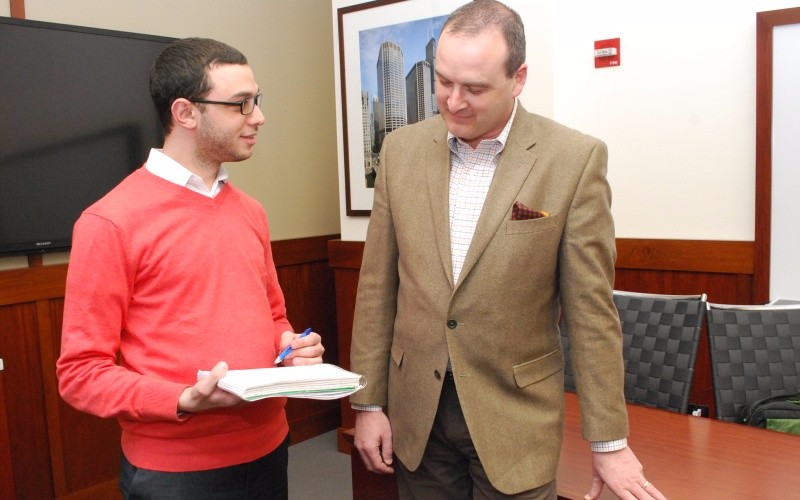 Assistant Professor of Marketing, Andrew Gallan (right) helps Muhanad Diab, a student in his popular health care management course on service design and the patient experience.
Assistant Professor of Marketing, Andrew Gallan (right) helps Muhanad Diab, a student in his popular health care management course on service design and the patient experience. It took just 115 characters and the hashtag "#PX" for Andrew Gallan to get the prompt attention of one of the largest health care systems in the country.
Gallan, an assistant professor of marketing at DePaul, was accompanying his wife on her hospital visit when he tweeted about their experience. The tweet set off a chain reaction that ended with an email and voicemail from the company's vice president.
Gallan uses the tweet and the hospital's response in his "Service Design and Patient Experience" course to show students a practical example of how vested health care institutions are in addressing this previously overlooked area in health care management.
The course focuses exclusively on the patient experience, an area, Gallan says, that offers unique opportunities for those seeking careers in health care management.
"There is a movement underway to reduce the amount of harm that health care institutions do to their own patients," says Gallan, a PhD who has 20 years of experience in sales, marketing and management and was a research assistant at the Mayo Clinic. "Really, the patient experience is inseparable from clinical care."
From Charts to Lobby Lighting
Patient experience — or in Twitter parlance #PX — is all about improving service to health care customers. This includes everything from clarity in clinical communication to lobby lighting and the softness of beds. Hospitals, doctors' offices and outpatient clinics are all looking for ways to shore up their patient satisfaction scores, primarily for one reason — the federal government.
In 2006, the Centers for Medicare & Medicaid Services (CMS), a federal agency that administers health care programs such as Medicare, created a customer satisfaction survey. They suggested health care institutions voluntarily administer the survey to patients.
Now, after nearly 10 years since its inception, the patient satisfaction survey is mandated and part of CMS' reimbursement payments are tied to its scores. This change in reimbursement payments became a catalyst for the growth in the patient experience arena.
Nationwide hospital CEOs are creating new jobs with titles, such as patient experience director and chief patient experience officer. It's an unmapped area for the health care industry, and DePaul's new course helps students navigate this brand new career path.
"The course helps students gain an appreciation for why understanding health care from the patient's perspective is important and how that impacts the management strategies of health care institutions," says Gallan.
Real-World Remedies
Gallan's course is divided into three sections:
- Understanding the business case for improving patient experience
- Analyzing and interpreting patient experience data
- Working with industry professionals to gain insight on how to improve patient experience
Within the course, students learn from a variety of patient experience experts around the nation. These experts, many working in multi-billion-dollar health systems, discuss their work and share best practices. In addition to the lectures, students work one-on-one with professional mentors on an aspect of patient experience so they can get hands-on training.
In addition, students are privy to large anonymous customer survey data sets, donated to Gallan's class by major health care institutions, so they can analyze actual patient experience data and come up with recommendations for improvement.
"We're trying to liberate the patient's voice from data," Gallan says, "And we teach students how to translate that data and communicate that data to senior management."
Students rave about the practicality and professionalism of the class.
"Dr. Gallan's class for me was the most valuable and most applicable to my current job," says Andres Valencia, patient experience advisor for University of Chicago Medicine (UCM), a four-hospital health system located on Chicago's South Side. Valencia is also a DePaul MBA student with an expected graduation completion in 2015.
"When I got this job I really hit the ground running," says Valencia, who spent six years in the hospitality industry before switching careers. "No one had to explain to me what patient surveys were, or how the data was collected and what issues there are. It's thanks to [Dr. Gallan's] class that I'm working in the field today."
Valencia was so pleased with the course that he returned as a professional mentor. He now mentors Muhanad Diab and Omar Shaker, who are currently taking the class. Diab and Shaker work with Valencia at UCM examining the patient discharge process and how it affects patient experience. They look at how hospital staff informs patients about their treatment options, follow-up visits, and other factors that affect patient health after they leave the hospital.
"It's great working with Andres because we get to go into the field," says Diab. "We observe the patient's behavior, as well as staff behavior during the discharge process, and compare what we see to the current best practices and what we are studying."
Diab was a pharmacist in his native country of Jordan before coming to DePaul to get his MBA. He says he loves Gallan's course because it focuses on the business side of health care management and teaches him how hospitals can gain a competitive advantage by focusing on patient services.
"Organizations are striving to offer the best service they can to patients to preserve their reputations," says Diab. "And this course teaches us how they do just that."